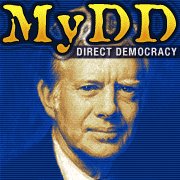No end to the extremes of BushCo: Bank Data Edition
From the New York Times, Bank Data Sifted in Secret by U.S. to Block Terror:
Under a secret Bush administration program initiated weeks after the Sept. 11 attacks, counterterrorism officials have gained access to financial records from a vast international database and examined banking transactions involving thousands of Americans and others in the United States, according to government and industry officials.The program is limited, government officials say, to tracing transactions of people suspected of having ties to Al Qaeda by reviewing records from the nerve center of the global banking industry, a Belgian cooperative that routes about $6 trillion daily between banks, brokerages, stock exchanges and other institutions. The records mostly involve wire transfers and other methods of moving money overseas and into and out of the United States. Most routine financial transactions confined to this country are not in the database.
Don't you feel secure that "government officials" of the Cheney Misadministration say this is limited to people of suspected ties to Al Qaeda just like the NSA spying with the assistance of the telecoms.
The program is grounded in part on the president's emergency economic powers, Mr. Levey said, and multiple safeguards have been imposed to protect against any unwarranted searches of Americans' records.The program, however, is a significant departure from typical practice in how the government acquires Americans' financial records. Treasury officials did not seek individual court-approved warrants or subpoenas to examine specific transactions, instead relying on broad administrative subpoenas for millions of records from the cooperative, known as Swift.
This is another program with no judicial oversight. What you don't about SWIFT? I'm not surprised. I'm familiar with it because of several years of consulting and architecture for secure transactions between financial institutions. This is extraordinary to me!
SWIFT released the following press release (via Los Angeles Times):
SWIFT is the industry-owned cooperative supplying secure, standardised messaging services and interface software to over 7,800 financial institutions worldwide. SWIFT is solely a messaging intermediary for transmitting secure and confidential financial messages between financial institutions. SWIFT is not a bank, nor does it hold accounts of any customers.SWIFT takes its role as a key infrastructure of the international financial system very seriously and cooperates with authorities to prevent illegal uses of the international financial system. Where required, SWIFT has to comply with valid subpoenas. SWIFT's compliance policy is published on http://www.swift.com/.
In the aftermath of the September 11th attacks, SWIFT responded to compulsory subpoenas for limited sets of data from the Office of Foreign Assets Control of the United States Department of the Treasury. Our fundamental principle has been to preserve the confidentiality of our users' data while complying with the lawful obligations in countries where we operate. Striking that balance has guided SWIFT through this process with the United States Department of the Treasury.
SWIFT negotiated with the U.S. Treasury over the scope and oversight of the subpoenas. Through this process, SWIFT received significant protections and assurances as to the purpose, confidentiality, oversight and control of the limited sets of data produced under the subpoenas. Independent audit controls provide additional assurance that these protections are fully complied with.
All of these actions have been undertaken with advice from international and U.S. legal counsel and following our longstanding procedures on compliance, established by our Board.
Well, we know there will be no Congressional oversight on this latest attack against our privacy and civil liberties. So, the question is how long before we discover cooperation by individual financial institutions about transactions on individual accounts -- not just between financial institutions?















0 Comments:
Post a Comment
<< Home